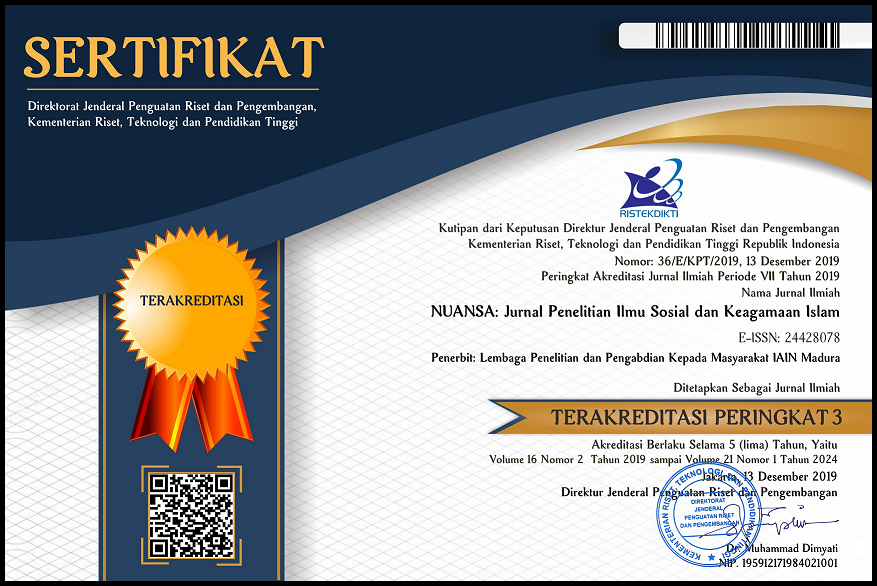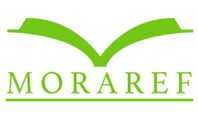NEGOSIASI KULTURAL DALAM UPAYA ISLAMISASI TRADISI ROKAT MASYARAKAT MADURA PROBOLINGGO
 Abstract views: 112
,
Abstract views: 112
,
 PDF downloads: 99
PDF downloads: 99
Abstract
In contemporary situations, the issue of the ancentral rokat tradition is closely associated with Islam. Nonetheless, in several literatures, reseachers typically concentrate on the history and rokat processes. Madura community in Tamansari Village, Probolinggo Regency, has a different history and meaning. Therefore, it is essential to examine the actions taken by the actors and the meanings that emerge in the community regarding changes in rokat tradition practice. This paper aims to examine the interpretation of the community and conduct a deeper analysis of the cultural negotiation process of the rokat tradition in the context of Islamization as a ritual practice. The research is conducted using a qualitative ethnographic research method, which includes direct observation, interviews, documentation, and a literature review, implementing the perspective of Mark R. Woodward. The research results indicate the existence of two categories of rokat leaders, namely the traditional Javanese rokat leader (adhering to ancestral teachings) and the Islamic rokat leader. The negotiation of Islamic rokat emerges through Islamic leaders who reinterpret the meaning of rokat within the framework of Islamic values, Meanwhile, Javanese rokat maintains the practice and traditional meaning. Islamic rokat is more preferred due to its relatively lower cost compared to Javanese rokat. However, some communities still firmly adhere to and believe in their traditional ancestral teachings, considering them as the refinement of tradition rather than just symbols.
Downloads
References
Arroisi, Jarman. “ALIRAN KEPERCAYAAN & KEBATINAN: Membaca Tradisi Dan Budaya Sinkretis Masyarakat Jawa.” Al-Hikmah: Jurnal Studi Agama-Agama 1, no. 1 (2015). https://doi.org/https://doi.org/10.30651/ah.v1i1.946.
Awalin, Fatkur Rohman Nur. “SLAMETAN: PERKEMBANGANNYA DALAM MASYARAKAT ISLAM-JAWA DI ERA MILENEAL.” Ikadbudi 7 (2018): 2. https://doi.org/http://dx.doi.org/10.21831/ikadbudi.v7i1.26672.
Ayu Citra Santyaningtyas. “Strategi Perlindungan Ekspresi Budaya Tradisional Di Indonesia.” Jurnal Heritage 8, no. 2 (2020): 107–13. https://doi.org/10.35891/heritage.v8i2.1959.
Chair, Badrul Munir. “Dimensi Kosmologis Ritual Rokat Pandhaba Pada Masyarakat Madura.” Jurnal SMART (Studi Masyarakat, Religi, Dan Tradisi) 6, no. 1 (2020): 127–41.
https://doi.org/10.18784/smart.v6i1.952.
Creswell, John W. Penelitian Kualitatif & Desain Riset: Memilih Di Antara Lima Pendekatan. Yogyakarta: Pustaka Pelajar, 2015.
Devy Rizkita Syafitri, Tumirin. “Manifestasi Cinta: Makna Biaya Dalam Tradisi Sedekah Bumi Desa Karangkiring.” Proseding Seminar Nasional Ekonomi Dan Bisnis 1, 2022, 107– 19. https://journal.um-surabaya.ac.id/index.php/Pro/article/view/12757.
Dewi Lestari, Lusiana. “Paper Perbandingan Agama Menilai Maraknya Kasus Intoleransi Agama Menurut Ajaran Kepercayaan Masyarakat Jawa Kuno (Kejawen).” Paper, Sekolah Tinggi Keguruan Dan Ilmu Pendidikan Widya Yuwana Madiun, 2019. https://osf.io/3jqbh/download/?format=pdf.
Effendy, Moh Hafid. Teori Dan Metode Kajian Budaya Etnik Madura. Edited by Imam Suyitno. CV. Jagad Media Publishing. Surabaya: CV. Jakad Media Publishing, 2022. https://medium.com/@arifwicaksanaa/pengertian-use-case-a7e576e1b6bf.
Erni. Riset Budaya. Edited by Muhammad Qadaruddin. Mempertahankan Tradisi Di Tengah Krisis Moralitas. Parepare: IAIN Parepare Nusantara Press, 2020.
Fadhilah, Amir. “STRUKTUR DAN POLA KEPEMIMPINAN KYAI DALAM PESANTREN DI JAWA.” HUNAFA: Jurnal Studia Islamika 8, no. 1 (2011): 101. https://doi.org/https://doi.org/10.24239/jsi.v8i1.89.101-120.
Geertz, Clifford. Clifford Geertz Abangan, Santri, Priyayi. Translated by Aswab Mahasin and Bur Rasuanto. Dialektika. Vol. 9. Komunitas Bambu, 2014.
Halik, Fathol. “ROKAT BHUJU’ VIS-À-VIS KOMPOLAN (Metamorfosis Elit Madura Pasca Keruntuhan Orde Baru).” Karsa: Journal of Social and Islamic Culture, 2012, 119–31. https://doi.org/10.19105/karsa.v12i2.137.
Khoiriyah, Fathul, and Zainuddin Syarif. “Eksistensi Tembang Mamaca (Macapat) Dalam Dimensi Kultur, Mistik Dan Religius.” Jurnal Pemikiran Keislaman 30, no. 2 (2019): 324–34. https://doi.org/10.33367/tribakti.v30i2.819.
Koentjaraningrat. Bunga Rampai KEBUDAYAAN MENTALITAS DAN PEMBANGUNAN. Cetakan kedua puluh. Jakarta: PT Gramedia Pustaka Utama, 2002.
Laili, Afrohatul. “Tradisi Rokatan Calon Pengantin Perspektif Fenomenologi (.” Universitas Islam Negeri Maulana Malik Ibrahim Malang, 2018. http://etheses.uinmalang.ac.id/id/eprint/11319.
Liliweri, Alo. Makna Budaya Dalam Komunikasi Antarbudaya. Edited by Uzair Fauzan. 1st ed. Yogyakarta: PT LKis Printing Cemerlang, 2002.
Prasetyo, Hery, Vidia Rosa, Eleanor Jones, and Milla Arianis. “The International Journal of Interdisciplinary Cultural Studies Sustaining Cultural Legitimation through the Theatrics of Power in the Gong Kyai Pradah Ritual” 15, no. 1 (2020). https://doi.org/10.18848/2327-008X/CGP.
Prihantini, Peni. “Ritual Rokat Pandhaba Dalam Pertunjukan Topeng Dhalang ‘Rukun Pewaras’ Slopeng Kajian Bentuk Dan Fungsi.” Terob 8, no. 1 (2017): 1–20. https://doi.org/https://doi.org/10.20111/st.v8i1.92.
Soelistyanto, Bambang. “Transformasi Budaya Ruwatan.” Berkala Arkeologi 16, no. 1 (1996): 13–24. https://doi.org/10.30883/jba.v16i1.742.
Sururin. “Book Review Islam in Java Normative Piety and Mysticism in the Sultanate of DIY.” Al-Maktabah 9 No 1 (2007): 112–19. http://repository.uinjkt.ac.id/dspace/handle/123456789/51537.
Susanti, Jijah Tri, and Dinna Eka Graha Lestari. “Tradisi Ruwatan Jawa Pada Masyarakat Desa Pulungdowo Malang.” Satwika : Kajian Ilmu Budaya Dan Perubahan Sosial 4, no. 2 (2021): 94–105. https://doi.org/10.22219/satwika.v4i2.14245.
Wahyudi, Sarjana Sigit. “Kepemimpinan Tradisional Jawa-Islam.” Sabda 6, no. 1 (2011): 23– 29. https://doi.org/https://doi.org/10.14710/jis.%25v.%25i.%25Y.1-13.
Woodward, Mark. R. ISLAM JAWA: Kesalehan Normatif versus Kebatinan. Translated by Hairus Salim HS. Yogyakarta: LKiS Yogyakarta, 2022.
Yanti, Fitri. “Pola Komunikasi Islam Terhadap Tradisi Heterodoks.” Analisis XIII, no. 1 (2013): 201–20. https://doi.org/http://dx.doi.org/10.24042/ajsk.v13i1.686.
Copyright (c) 2024 NUANSA: Jurnal Penelitian Ilmu Sosial dan Keagamaan Islam

This work is licensed under a Creative Commons Attribution-NonCommercial 4.0 International License.
The journal operates an Open Access policy under a Creative Commons Attribution-NonCommercial 4.0 International License (CC-BY-NC) 
Authors who publish with this journal agree to the following terms:
- Authors retain copyright and grant the journal right of first publication with the work simultaneously licensed under a Creative Commons Attribution License that allows others to share the work with an acknowledgement of the work's authorship and initial publication in this journal.
- Authors are able to enter into separate, additional contractual arrangements for the non-exclusive distribution of the journal's published version of the work (e.g., post it to an institutional repository or publish it in a book), with an acknowledgement of its initial publication in this journal.
- Authors are permitted and encouraged to post their work online (e.g., in institutional repositories or on their website) prior to and during the submission process, as it can lead to productive exchanges, as well as earlier and greater citation of published work.





















